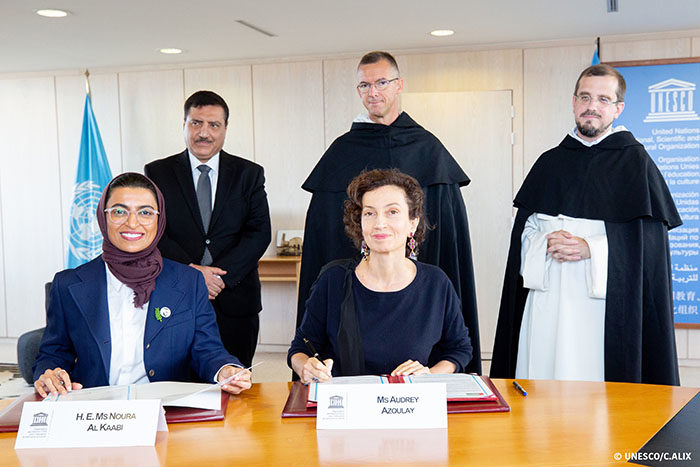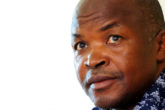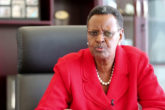
Photo: Cision PR Newswire
United Arab Emirates, a Muslim-majority country in the Middle East, has announced plans to help rebuild two Christian churches destroyed by the Islamic State in Mosul, Iraq.
The partnership, which was signed at the UNESCO headquarters in Paris to ‘Revive the Spirit of Mosul’, is part of the UAE’s Year of Tolerance initiative and is an extension to an earlier $50.4 million agreement signed in April 2018 to help rebuild the cultural heritage of Mosul, after the city fell to Daesh occupation in June 2014.
Iraqi forces retook the city in July 2017 but not before 28 sites of religious significance had been destroyed by the terrorist organisation.
Among them were the 800-year-old Al Tahera Church of Syriac Catholics in Mosul, considered to be one of the largest and oldest churches in the Midan area of Mosul’s Old City; and the Al Saa’a Church, ‘Church of the Clock’ in Arabic, also known as Our Lady of the Hour, which was built by Dominican fathers between 1866 and 1873, and became a living example of brotherhood between the people of Mosul, who graduated from its educational institution together regardless of their faith.
Noura Al Kaabi, UAE Minister of Culture and Knowledge Development, witnessed the signing in Paris, and said, “Today’s signing is a pioneering partnership that sends a message of light, in seemingly darker times. By rebuilding a fraction of the past, Iraq can shape its future as an inclusive, tolerant and open society which has always found a tangible manifestation in Mosul’s rich historical sites.”
In doing this the UAE had become the first country in the world to help reconstruct christian churches in Iraq, she added.
Also present at the signing was UNECSO general director Audrey Azoulay, who said, “This rehabilitation aims to reclaim the true spirit of the City, a story of peaceful coexistence between different religious and ethnic groups. I am thankful to the United Arab Emirates and Minister Al Kaabi who have generously supported our Initiative since the beginning, and who believe, as we do, that there is no true reconstruction and revival without Culture and Education.”
The project initially concerned the restoration and reconstruction of other historic landmarks in Mosul, notably the emblematic Al-Nouri Mosque and its celebrated, leaning 45-metre Al-Hadba Minaret, built more than 840 years ago. A museum and memorial site will also exhibit and preserve remnants of the restored mosques and churches.
Over 1,000 jobs will be created for young Moslawis. To date 27 Iraqis have been employed and four Iraqi companies have been contracted. The UAE has also engaged with over 50 local Iraqis to get their feedback on how the restoration should be done to best reflect their country’s legacy.

